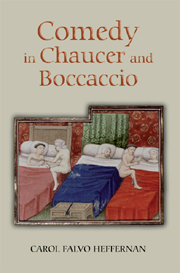Book contents
- Frontmatter
- Contents
- In memory Of Thomas Farel Heffernan 1933–2009
- Preface and Acknowledgments
- 1 Introductory matters
- 2 The Comic Inheritance of Boccaccio and Chaucer
- 3 Parallel Comic Tales in the Decameron and the Canterbury Tales
- 4 Antifraternal Satire in Boccaccio and Chaucer
- 5 Adding Comedy: Boccaccio's Filostrato and Chaucer's Troilus and Criseyde
- Conclusion
- Bibliography
- Index
- Chaucer Studies
1 - Introductory matters
Published online by Cambridge University Press: 12 September 2012
- Frontmatter
- Contents
- In memory Of Thomas Farel Heffernan 1933–2009
- Preface and Acknowledgments
- 1 Introductory matters
- 2 The Comic Inheritance of Boccaccio and Chaucer
- 3 Parallel Comic Tales in the Decameron and the Canterbury Tales
- 4 Antifraternal Satire in Boccaccio and Chaucer
- 5 Adding Comedy: Boccaccio's Filostrato and Chaucer's Troilus and Criseyde
- Conclusion
- Bibliography
- Index
- Chaucer Studies
Summary
When is Chaucer Known in Italy?
The question may seem an odd one, but it is, in fact, what started me on the road to finding the subject of this book. Scholars of medieval and early modern English literature are used to considering English interest in Italian letters – if not Chaucer's use of Dante, Petrarch, and Boccaccio, then Elizabethan interest in Italian humanism and the Italian sonnet. It is a commonplace that from the point of view of the continent, England in the late middle Ages was thought to be relatively backward; Boccaccio's Decameron 2, 3 compares it to Barbary, the north African coast. When I first thought to ask the question – “When is Chaucer known in Italy?” – I approached an Italianist who, like myself, took part in a session of the American Boccaccio Society at a recent modern Language Association convention. She answered, after just the slightest hesitation, with words that added up to something like, “Late, very late, probably the nineteenth century.” Her assumption was that while France and Germany were aware of Chaucer's importance by the sixteenth century, Italy, which had given Chaucer so much inspiration, was late in recognizing the English poet. Still, it seemed implausible to me that Chaucer could have gained access to important Italian libraries in 1372 and 1378 while on diplomatic trips to Italy, might even have been observed reading manuscripts of works by Dante and Boccaccio, perhaps have arranged to acquire manuscripts of their works for his own use, and no Italian have been curious enough to ask Chaucer about his literary interests and his own writing.
- Type
- Chapter
- Information
- Comedy in Chaucer and Boccaccio , pp. 1 - 19Publisher: Boydell & BrewerPrint publication year: 2009



